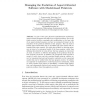Free Online Productivity Tools
i2Speak
i2Symbol
i2OCR
iTex2Img
iWeb2Print
iWeb2Shot
i2Type
iPdf2Split
iPdf2Merge
i2Bopomofo
i2Arabic
i2Style
i2Image
i2PDF
iLatex2Rtf
Sci2ools
113
click to vote
ECOOP
2006
Springer
2006
Springer
Managing the Evolution of Aspect-Oriented Software with Model-Based Pointcuts
In spite of the more advanced modularisation mechanisms, aspect-oriented programs still suffer from evolution problems. Due to the fragile pointcut problem, seemingly safe modifications to the base code of an aspect-oriented program can have an unexpected impact on the semantics of the pointcuts defined in that program. This can lead to broken aspect functionality due to accidental join point misses and unintended join point captures. We tackle this problem by declaring pointcuts in terms of a conceptual model of the base program, rather than defining them directly in terms of how the base program is structured. As such, we achieve an effective decoupling of the pointcuts from the base program's structure. In addition, the conceptual model provides a means to verify where and why potential fragile pointcut conflicts occur, by imposing structural and semantic constraints on the conceptual model, that can be verified when the base program evolves. To validate our approach we impleme...
Related Content
| Added | 22 Aug 2010 |
| Updated | 22 Aug 2010 |
| Type | Conference |
| Year | 2006 |
| Where | ECOOP |
| Authors | Andy Kellens, Kim Mens, Johan Brichau, Kris Gybels |
Comments (0)

